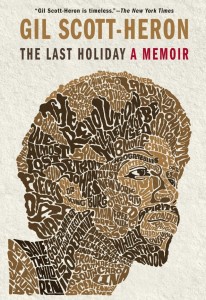lip lit: gil scott-heron, the last holiday
In theory, The Last Holiday is an autobiographical account of the concert tour which resulted in legislation to make Martin Luther King’s birthday a public holiday. Author Gil Scott-Heron did a huge 41-city tour, supporting Stevie Wonder throughout America. The tour promoted Wonder’s Hotter than July album, which included the song “Happy Birthday” – a key part of the campaign.
But the book is more than an account of this tour. It’s an account of Scott-Heron’s life. The reasoning, writes the publisher, is that ‘it was clear to Gil that in order to tell Stevie Wonder’s story, he would have to tell his own story… it was only by opening up his own past that he felt he could explain why he had ended up on the tour with Stevie Wonder.’
Gil Scott-Heron is dead. This memoir, if that’s what it is, was published posthumously. I figure this bears mentioning because I had never heard of him before. He died at the untimely age of 62. He was a writer, a poet, a musician, an activist. His verse has been hugely influential on hip hop music. He had been sick, was subject to the throes of drug abuse, he went to prison. This book isn’t about that. The book tells a different story which ought to be known.
I never knew that Stevie Wonder led the campaign for Martin Luther King Day. It was successful nonetheless. The goal was achieved in 1986 under an unlikely Regan government. ‘Unlikely’ is something Scott-Heron emphasises himself. He writes of Regan, ‘I thought the man might be suffering from an inner-ear problem. There was often a connection between the cochlea and one’s balance. And Regan seemed to be tilting to the right.’
Despite Regan, it happened. If you question the validity of a public holiday to honour Martin Luther King, if you think that it’s a trivial thing to want, to fight for, you need to read The Last Holiday.
Scott-Heron was right to think that it was necessary to tell his story in order for the reader to really understand the campaign and its context. The vast majority of the book is context which tells us where Scott-Heron is coming from.
Scott-Heron grew up in a changing social landscape. He describes the politics of segregation. His first school was black-only, his grandmother was the only black person he knew with the ability to command enough respect to be able to purchase something on credit. He also described his childhood pet, a creature he loved, a black cat with a patch of white fur at the throat, and how the cat was poisoned one day. His grandmother protected him from watching it die under their porch.
Gradually, African Americans were afforded more rights. Scott-Heron moved into a few different mixed race schools and was awarded a scholarship to an expensive private school in New York. To get there, he had to appeal to the school board. They were concerned that he may not fit in, or would feel alienated or resentful about the insane levels of wealth at his classmates’ disposal. While he would catch the subway home and work part-time (despite being under the minimum working age) they would be shuttled around in private limousines and would never worry about money. The board meeting was interrupted when Scott-Heron received news from the hospital that his mother was sick with diabetes. He left, apologising and explaining himself. The board admired his politeness and his priorities. Though it was part luck, part raw talent, Scott-Heron started receiving the kinds of opportunities that would allow him to succeed in life and in difficult pursuits such as writing and music.
The point is that, within Scott-Heron’s lifetime, the legacy of Martin Luther King was tangible. He made a huge difference to the daily lives of African Americans and created a movement where they gained opportunities as well as the chance to dream big. The work is by no means done but the accomplishment, which once seemed impossible, warrants a holiday.
Despite ostensibly being a book about the campaign, it really lacks focus on this point until the end. That’s okay. At least, it didn’t bother me. Life lacks focus, and it is, after all, a life story. Some of the more poignant moments are peripheral issues but I’m so glad that they are there. The death of Scott-Heron’s beloved grandmother, his work at building a music career and thoughts on music in general, his move between different cities, recollections of problems at his college, reflections on being a father, his story of the discovery of the death of his friend John Lennon. Although Scott-Heron’s life was short, it was full. That’s the real joy of The Last Holiday.
Image source: 1



His music and poetry are absolutely amazing. I downloaded his album after I found out he died and it is just wonderful. I think the world has lost a revolutionary, and under such sad circumstances.
Pingback: lip magazine: lip lit: gil scott-heron, the last holiday « Erin Stewart